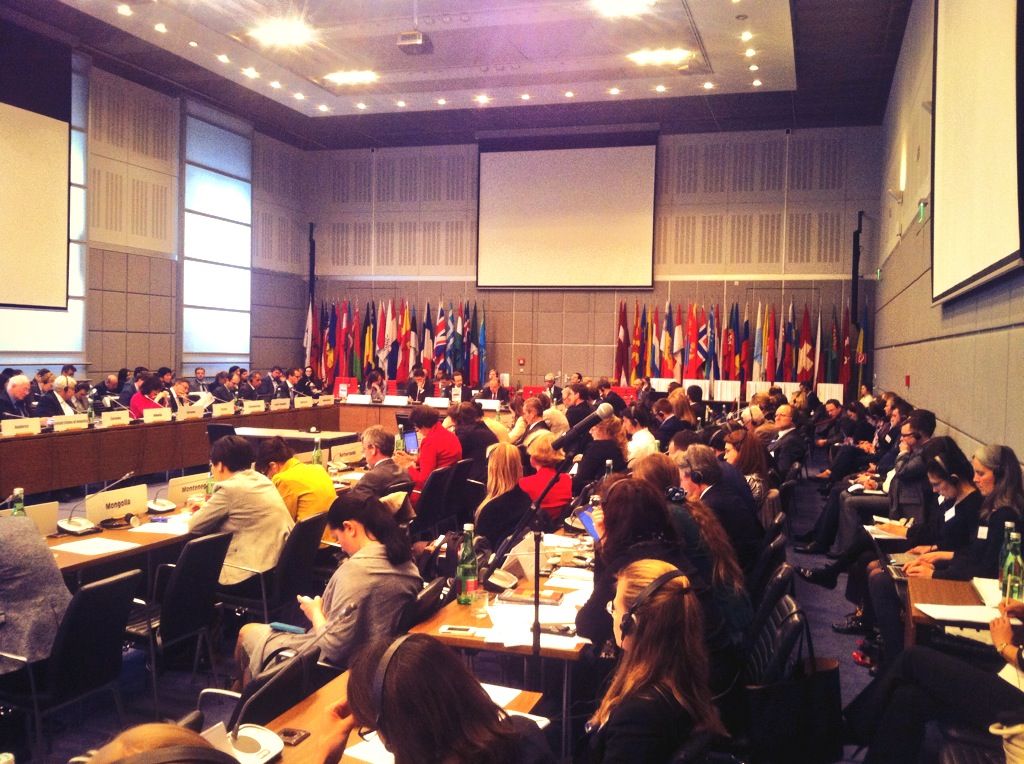Governments must open places of detention for inspection
At the end of last week, MDAC was pleased to see the Organization for Security and Cooperation in Europe (OSCE) taking note of the importance of monitoring institutions housing people with disabilities as a key part of its efforts to tackle torture and ill-treatment. It is important that this is given much higher priority to ensure that abusive practices inside institutions do not stay hidden.
 OSCE Supplementary Human Dimension Meeting on Torture, Vienna
OSCE Supplementary Human Dimension Meeting on Torture, Vienna
The continuing practice of subjecting people with mental disabilities to ill-treatment and torture remains a very distressing and present reality, particularly in institutions which segregate them from the rest of society. Just last week Al Jazeera broadcast the appalling conditions inside some institutions for people with disabilities in Romania including images of people with disabilities tied to their beds, being denied access to light, and allegations of abuse by staff members. It is well-documented that the practice of segregating people with disabilities by placing them in institutions creates the conditions in which they are significantly more vulnerable to abuse and ill-treatment, especially where there is no independent oversight. In Romania, some of these institutions are even financed by the European Commmission.
Earlier this month, MDAC led advocacy at the Organization for Security and Cooperation in Europe (OSCE) to press for independent monitoring and inspection of all closed institutions, including psychiatric hospitals and social care institutions.
On 7-9 April MDAC joined over 50 experts, lawyers and advocates from across the 57 OSCE members states to discuss priorities in global efforts to eradicate torture, reminding delegates that closed institutions for people with disabilities must be a focus of independent monitoring. Indeed, with estimates suggesting over 1.2 million people with disabilities living in institutions across Europe alone, a much higher priority has to be placed on taking preventive measures to end abuses in institutions that can often go unchallenged and unpunished.
Recommendations to Member States and the OSCE institutions were developed, which will be presented to the Ministerial Council in December this year. MDAC worked hard to ensure that a number of them specifically addressed the rights of people with disabilities, including:
-
OSCE should develop a programme of monitoring places of detention and closed institutions, including psychiatric hospitals and social care institutions;
-
OSCE should conduct a study on whether specific groups are more vulnerable to torture, and their particular needs when deprived of their liberty, including people with disabilities;
-
National legislation should be supported and developed which guarantees protection to all people deprived of their liberty from the moment they are apprehended;
-
Civil society groups, NGOs and DPOs must be fully involved in monitoring institutions, in line with Article 33 of the UN Convention on the Rights of Persons with Disabilities.
The following two days, 10-11 April, diplomatic representatives discussed the biggest obstacles to progress in the implementation of States’ obligations and commitments under the UN Convention against Torture. UN Special Rapporteur on Torture, Juan E. Mendez called for a focus on the heart of problem, noting that: "Torture and ill-treatment usually takes place in isolated and unmonitored places." The revelations covered in 'Europe's Hidden Shame' on Al Jazeera last week, about ill-treatment against people with disabilities in Romanian institutions bears this point out. (You can support our campaign for accountability, compensation and damages for the victims here.)
Following this, Mark Thompson, Secretary General of the Association for the Prevention of Torture, stressed that central to progress is the establishment of National Preventive Mechanisms (NPMs), an obligation on States that have ratified the Optional Protocol to the Convention against Torture. These bodies carry out visits to places where people are deprived of their liberty and produce reports and recommendations to improve conditions and protection. So far only 39 out of 57 OSCE States are parties to the Optional Protocol and only 36 NPMs have been established. Romania has repeatedly failed to establish its own NPM despite being a party to the Optional Protocol. These national independent inspectorates are of paramount importance in holding States to account for torture and ill-treatment in places where people are deprived of their liberty. (You can find the obligatory Annual Reports of NPMs here, and links to public visit reports here.)
Voislav Stojanovski, of the Helsinki Committee for Human Rights of the Republic of Macedonia, raised concerns over the independence of some NPMs. He highlighted the importance of civil society in supporting their functions and made the following conclusion that summed up the discussion from the two-day forum – a conclusion that MDAC fully endorses:
NGOs have an informal role in countering the risk of institutions developing their own values and norms and losing the sight of community values and norms that are based on human decency. Our role is to provide an open window so the public can see what happens on the inside and ensure accountability. We work with vulnerable groups which are often voiceless. What we try to do is give a voice to the voiceless.
This conclusion was supported by the official recommendation that NGOs and civil society groups should be given legal and financial backing to support essential monitoring work that will ensure accountability across OSCE Member States.
You can support MDAC’s role in seeking to eradicate torture of people with disabilities by donating HERE.

